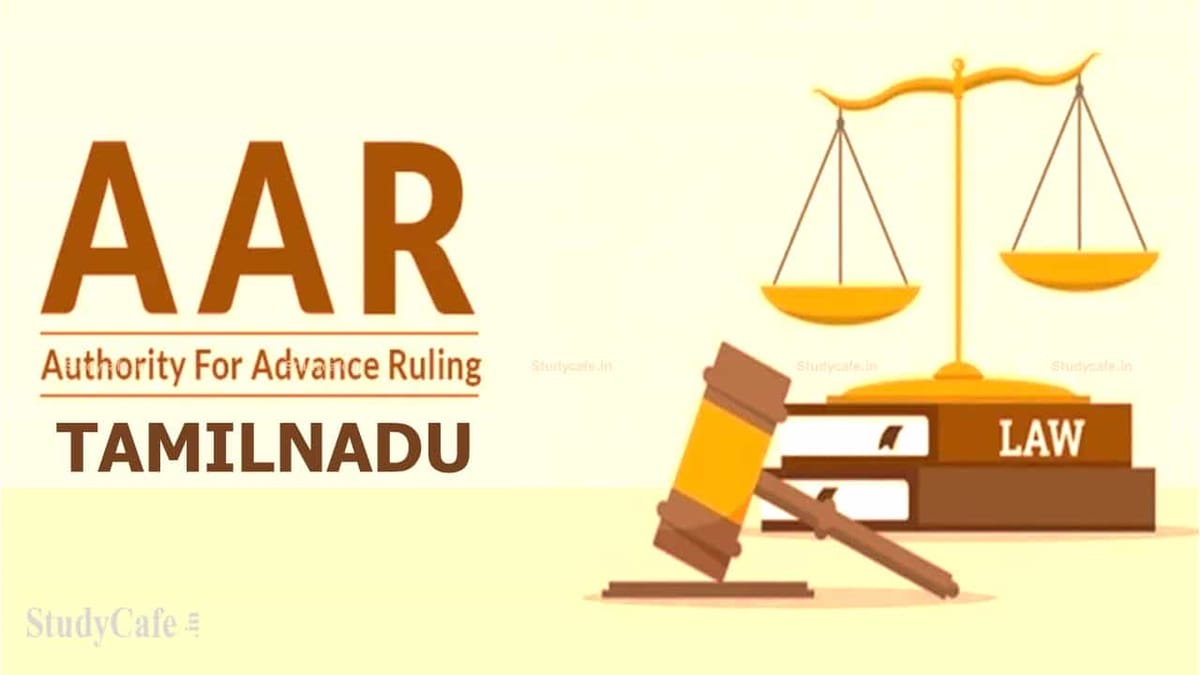Shuba Lakshmanan | Nov 27, 2021 |

Improper evidence produced by the applicant on being asked by AAR, leads to withdrawal of application-AAR
Introduction: An advanced ruling is a mechanism whereby taxpayers can get answers or clarifications regarding supply of goods and services, directly from tax authorities and the primary objectives for such a mechanism are to reduce litigation, attract FDI due to transparent tax liability, provide certainty with respect to tax liability and disclose ruling in an inexpensive and transparent manner. The Authority for Advanced Ruling (AAR) constituted by the tax authorities interprets tax laws for the taxpayers and it was created to address any issues faced by taxpayers and assist them by providing a decision on the clarification sought. The AAR’s appellate authority is the AAAR (Appellate Authority or National Appellate Authority for Advanced Ruling). Section 95 to Section 106 in Chapter XVII of CGST Act covers the procedures and rules related to advance rulings. An application is made by the taxpayer on the clarification sought by them. The taxpayer is provided an opportunity of being heard by the AAR. If there is consensus on resolution on the clarification sought between the AAR and taxpayer, an ‘Advance Ruling’ is issued by the AAR and on the contrary, the matter is referred to the AAAR.
The question of law which is address through this AAR is as follows:
• Whether security services provided to IIT Madras is exempt from GST as per notification no. 12/2017 – Central Tax (Rate) dated 28.Jun.2017, serial no. 66 and the rate of tax is nil as per serial number 3 of the said notification.
Facts of the application made to AAR, by taxpayer ‘Security and Intelligence Services (India) Ltd.(applicant)’, dated 05-Dec-2021:
The applicant, Security and Intelligence Services (India) Ltd., is in the business of providing security services to several organizations all over India, which includes premier educational institutions such as IIT Madras. The applicant has made the present application to AAR on the grounds that IIT, Madras, a higher educational institution which was formed in collaboration on account of a Indo-German agreement is exempt from payment of GST as it is a higher education institution and will fall into the category of ‘educational institution’ for the purpose of GST exemption.
The applicant submitted that IIT Madras will not fall under the category of ‘educational institution’ and further elaborated on the definition of educational institution as per serial no. 66 of notification no. 12/2017 – Central Tax (Rate) dated 28.Jun.2017, which reads as follows.
“an institute providing services by way of-
(i) Pre-school education and education up to higher secondary school or equivalent
(ii) Education as a part of a curriculum for obtaining a qualification recognized by any law for the time being in force
(iii) Education as part of an approved vocational education course. “
The applicant submitted that IIT Madras would not fall under serial number (i) and (iii) of the above definition but can fit under serial number (ii). But since IIT Madras even if construed as a governmental institution on accord of the Indo-German agreement, the security services provided by the applicant does not qualify as service provided in the nature as provided by a Panchayat or Municipality under the Constitution of India, as internal security services of an institute imparting higher education is not listed as a function of a Panchayat or Municipality. If the service description of the applicant did qualify as a function performed by a Panchayat or Municipality, then the exemption of payment of GST would have been applicable. For the aforementioned reasons, the applicant contended that it cannot avail exemption under GST as per serial no. 66 of notification no. 12/2017 – Central Tax (Rate) dated 28.Jun.2017.
Observations and final ruling by AAR vide Order No. 16/AAR/2021 dated 07.May.2021:
On the application submitted, the AAR called for a personal hearing of the applicant on 12.Frb.2021. The applicant was represented by its authorized representative and the AAR members called for the following documents by the applicant.
Since applicant did not provide the details, a notice was sent on 19.Mar.2021 calling for the documents and the applicant submitted the following documents in return.
The applicant further submitted to the AAR that they had erroneously stated the institutions name as IIT, Madras instead of IITDM, Kancheepuram. The authorized representative of the applicant submitted that they were told that the services were being made for IIT, Madras basis which the erroneous application was made and when documents were presented, it proved to be a mistake. The AAR ruled that even though the applicant had made elaborate submissions about the constitution of IIT, Madras, since as per application there was no actual supply of goods or services to IIT, Madras, the authority accepted the withdrawal of the application by the applicant on their request.
This case is presented just to reiterate that any Courts/Tribunal/Advanced ruling authority proceedings have to be based on evidence and and not on oral representations evidence plays a vital role on decisions provided by the concerned authorities, even though a question of GST law is not answered. The authorities time and efforts are not to be wasted and it becomes the responsibility of professionals to ensure legitimate representations for their clients.
To Read the Ruling Download PDF Given Below :
In case of any Doubt regarding Membership you can mail us at [email protected]
Join Studycafe's WhatsApp Group or Telegram Channel for Latest Updates on Government Job, Sarkari Naukri, Private Jobs, Income Tax, GST, Companies Act, Judgements and CA, CS, ICWA, and MUCH MORE!"